英语:Unit-5-《What’s-the-Weather-like?》复习课件(1)(北京课改版七年级下)
新人教版PEP五年级英语上册各单元知识点复习总结
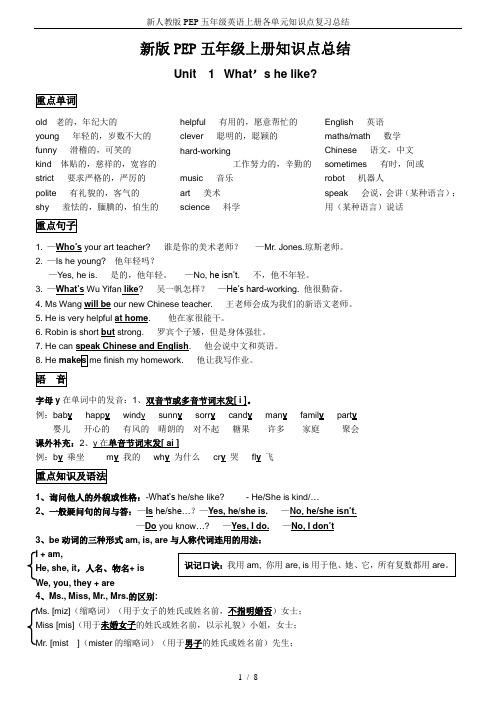
新人教版PEP五年级英语上册各单元知识点复习总结新版PEP五年级上册知识点总结Unit 1 What’s he like?重点单词old 老的,年纪大的young 年轻的,岁数不大的funny 滑稽的,可笑的kind 体贴的,慈祥的,宽容的strict 要求严格的,严厉的polite 有礼貌的,客气的shy 羞怯的,腼腆的,怕生的helpful 有用的,愿意帮忙的clever 聪明的,聪颖的hard-working工作努力的,辛勤的music 音乐art 美术science 科学English 英语maths/math 数学Chinese 语文,中文sometimes 有时,间或robot 机器人speak 会说,会讲(某种语言);用(某种语言)说话重点句子1. —Who’s your art teacher? 谁是你的美术老师?—Mr. Jones.琼斯老师。
2. —Is he young? 他年轻吗?—Yes, he is. 是的,他年轻。
—No, he isn’t.不,他不年轻。
3. —What’s Wu Yifan like? 吴一帆怎样?—He’s hard-working. 他很勤奋。
4. Ms Wang will be our new Chinese teacher. 王老师会成为我们的新语文老师。
5. He is very helpful at home. 他在家很能干。
6. Robin is short but strong. 罗宾个子矮,但是身体强壮。
7. He can speak Chinese and English. 他会说中文和英语。
8. He makes me finish my homework. 他让我写作业。
语音字母y在单词中的发音:1、双音节或多音节词末发[ i ]。
例:bab y happ y windy sunn y sorr y cand y man y famil y part y婴儿开心的有风的晴朗的对不起糖果许多家庭聚会课外补充:2、y在单音节词末发[ ai ]例:b y 乘坐m y 我的wh y 为什么cr y 哭fl y 飞重点知识及语法1、询问他人的外貌或性格:-What’s he/she like? - He/She is kind/…2、一般疑问句的问与答:—Is he/she…?—Yes, he/she is.—No, he/she isn’t.—Do you know…? —Yes, I do.—No, I don’t3、be动词的三种形式am, is, are与人称代词连用的用法:I + am,He, she, it,人名、物名+ isWe, you, they + are4、Ms., Miss, Mr., Mrs.的区别:Ms. [miz](缩略词)(用于女子的姓氏或姓名前,不指明婚否)女士;Miss [mis](用于未婚女子的姓氏或姓名前,以示礼貌)小姐,女士;Mr. [mist](mister的缩略词)(用于男子的姓氏或姓名前)先生;识记口诀:我用am, 你用are, is用于他、她、它,所有复数都用are。
陕旅版英语五年级下册第五单元《What's the weather like today》Unit5第三课时 课件PPT

will
/wɪl/ 将;愿意
【用法】will表示将来的动作或状态。 will是助动词,后接动词原形
【例句】。He will be home at six. 他六点回家。
游戏时间
What's missing?
snowy
will
fine
say
sunny weather report
cloudy
重点句型一 We are going to climb the mountains with our teachers. 我们打算和我们的老师一起去爬山。
【详解】be going to是一般将来时的一种表现形式,表示将来某个时
间将要发生的动作或存在的状态,意思为“打算,将要”。
How is the weather tomorrow?
二、把下列句子翻译成汉语。
1. It's sunny today. _今_天__天__气__晴_朗__。_______________________________
2. I'm going to climb the mountains tomorrow. _我_明__天__打__算_去__爬__山__。___________________________
1. 你虽然没有完整地回答问题,但你能大胆发言就是好样的!
此页为防盗标记页(下载后可删)对提问思考学生激励性语言(收藏打印版,此页右键可以删除)
1、你的眼睛真亮,发现这么多问题! 2、能提出这么有价值的问题来,真了不起! 3、会提问的孩子,就是聪明的孩子! 4、这个问题很有价值,我们可以共同研究一下! 5、这种想法别具一格,令人耳目一新,请再说一遍好吗? 6、多么好的想法啊,你真是一个会想的孩子! 7、猜测是科学发现的前奏,你们已经迈出了精彩的一步! 8、没关系,大声地把自己的想法说出来,我知道你能行! 9、你真聪明!想出了这么妙的方法,真是个爱动脑筋的小朋友! 10、你又想出新方法了,真会动脑筋,能不能讲给大家听一听? 11、你的想法很独特,老师都佩服你! 12、你特别爱动脑筋,常常一鸣惊人,让大家禁不住要为你鼓掌喝彩! 13、你的发言给了我很大的启发,真谢谢你! 14、瞧瞧,谁是火眼金睛,发现得最多、最快? 15、你发现了这么重要的方法,老师为你感到骄傲! 16、你真爱动脑筋,老师就喜欢你思考的样子! 17、你的回答真是与众不同啊,很有创造性,老师特欣赏你这点! 18、××同学真聪明!想出了这么妙的方法,真是个爱动脑筋的同学! 19、你的思维很独特,你能具体说说自己的想法吗? 20、这么好的想法,为什么不大声地、自信地表达出来呢? 21、你有自己独特想法,真了不起! 22、你的办法真好!考虑的真全面! 23、你很会思考,真像一个小科学家! 24、老师很欣赏你实事求是的态度! 25、你的记录很有特色,可以获得“牛津奖”!
六年级上册英语教案-Unit 5 It will be sunny and cool tomorro

Unit 5 It will be sunny and cool tomorrow【第一课时】【教学目标】(一)语言目标:1.词汇:能听懂、会说、认读新单词forecast, clear, heavy, light, rain;能听懂、理解、会说新单词won't;能在语境中复习与运用关于天气的旧单词sunny, rainy, cold, warm, cool, hot.2.句型:能理解、运用句型“It will/ won't be ... tomorrow.”描述不同天气;能理解、运用句型“There will/ won't be a …”进一步描述不同天气.(二)应用目标:1.能用英文指认将来的不同天气.2.能向同伴介绍将来的天气情况.3.能听懂、会说课文A部分的天气预报.【教学重难点】重点:能听懂、会说、认读新单词forecast, clear, heavy, light, rain;能用句型“It will/ won't be … tomorrow”描述不同天气;能用句型“There will/ won't be a ...”对不同天气做出细致描述.难点:能运用名词rain, wind, snow等以及它们相对应的形容词rainy, windy, snowy等;能理解并学会运用“It will/ won't be …”与“There will/ won't be a …”.【教学准备】单词卡片、课本图片、课文录音、课件等.【教学过程】I. 热身/复习(Warm-up/ Revision)1.GreetingsT: What's the weather like today?Ss: It's sunny/ cloudy/... (根据实际情况回答)2.Sing a song: How is the weather?How is the weather? It's a fine day.How is the weather? It's a cloudy day.How is the weather? It's raining.How is the weather? It's snowing.II. 新课呈现(Presentation)1.New words and new sentences(1)Brainstorming教师出示核心单词weather,在weather四周出示不同天气的图片,帮助学生复习已学过的天气单词sunny, rainy, windy, snowy, cold, warm, cool, hot等.(根据学情,也可不提供图片,让学生自由发挥.)(2)情境创设:教师结合实际,为学生创设秋游的情境,在情境中学习并操练新单词weather forecast, clear, heavy, light, rain, won't 等.师生讨论:提到秋游,孩子们首先会考虑什么?(天气、地点等因素)T: Good weather is very important. Now let's listen to a weather forecast. (板书并操练新单词)用课件播放声音或教师现场配音:This is CCTV. It's time for the weather forecast. Tomorrow will be clear in××. It will be sunny and cool.T: Shall we go out tomorrow? (可播放多次后提问)T: So it will be clear. “Clear”means “sunny”So we will go out tomorrow! (教师假装接到在北京的朋友的电话,然后向学生转述电话内容.)Just now, my friend Lily called me. She is a teacher, too. Her students in Beijing will have a school outing tomorrow, too. But what about the weather there? Listen again.播放声音之前,用课件或卡片出示三个句子让学生填空:It will_______ in Beijing. There will be ________in the morning, but there will be ______in the afternoon.用课件播放声音或教师现场配音:This is CCTV. It's time for the weather forecast. It will rain in Beijing. There will be a light rain in the morning, but there will be a heavy rain in the afternoon.学生作答,并在教师的简笔画帮助下,理解light rain与heavy rain.T: What a pity! They won't go out tomorrow.(理解、操练won't)2.The text(1)第一步:Listen and count 不打开书,听音.听音前给出任务:a.How many cities can you hear?b.What are they?(2)第二步:Listen and find(3)第三步:Read and check打开书,圈出五个城市的名称及天气,并检查自己听到的是否正确.(4)第四步:Listen and repeat听音,跟读,引导学生正确模仿,提醒学生注意读出天气预报员的语气.(5)第五步:Read and act根据教学挂图,引导学生记忆天气预报和表演.III. 趣味操练(Practice)1.游戏:吟古诗,根据古诗的描述说出相应的天气.教师出示古诗,学生朗读后说出相应的天气,可师生、学生问答.如:敕勒川,阴山下,天似穹庐,笼盖四野.天苍苍,野茫茫,风吹草低见牛羊.(可复习windy, strong wind等词)碧玉妆成一树高,万条垂下绿丝绦.不知细叶谁裁出,二月春风似剪刀.(可复习spring, warm, sunny等词)春眠不觉晓,处处闻啼鸟.夜来风雨声,花落知多少?(可说句子: It was rainy and windy last night, but maybe it will be sunny/...)独在异乡为异客,每逢佳节倍思亲.遥知兄弟登高处,遍插茱萸少一人.(可复习autumn, cool 等词)千里黄云白日曛,北风吹雁雪纷纷.莫愁前路无知己,天下谁人不识君?(可复习winter, snowy, heavy snow等词)Teaching Tips:(1)此活动帮助学生复习并巩固已学的有关天气的单词与句型.(2)此活动体现了英语学科与语文学科的渗透.同时,这些古诗均选自小学生必背古诗70首,六年级学生能够理解诗文.2.情境创设:周末快到了,和朋友一起讨论周末活动的计划.如:S1: Hello, Jim, nice to meet you.S2: Peter, nice to meet you, too. Tomorrow is Saturday. What are you going to do on Saturday?S1: I'm going to play basketball with my lather.S2: Did you watch the weather forecast?S1: Yes. It will be sunny and warm. What about you?S2: I will go to the bookstore.【作业布置】1.听一听,读一读:认真听、有感情地朗读A部分内容.2.背一背,记一记:和好朋友比一比,看谁能更快更好地背出A部分内容与默出B部分单词.。
PEP小学五年级英语语法要点及习题-现在进行时
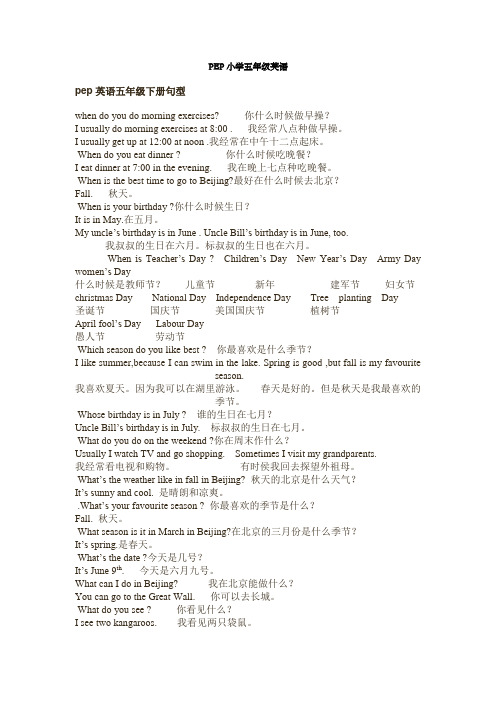
PEP小学五年级英语pep英语五年级下册句型when do you do morning exercises? 你什么时候做早操?I usually do morning exercises at 8:00 . 我经常八点种做早操。
I usually get up at 12:00 at noon .我经常在中午十二点起床。
When do you eat dinner ? 你什么时候吃晚餐?I eat dinner at 7:00 in the evening. 我在晚上七点种吃晚餐。
When is the best time to go to Beijing?最好在什么时候去北京?Fall. 秋天。
When is your birthday ?你什么时候生日?It is in May.在五月。
My uncle’s birthday is in June . Uncle Bill’s birthday is in June, too.我叔叔的生日在六月。
标叔叔的生日也在六月。
When is Teacher’s Day ? Children’s Day New Year’s Day Army Day women’s Day什么时候是教师节?儿童节新年建军节妇女节christmas Day National Day Independence Day Tree planting Day圣诞节国庆节美国国庆节植树节April fool’s Day Labour Day愚人节劳动节Which season do you like best ? 你最喜欢是什么季节?I like summer,because I can swim in the lake. Spring is good ,but fall is my favouriteseason.我喜欢夏天。
因为我可以在湖里游泳。
春天是好的。
但是秋天是我最喜欢的季节。
Unit 5单元复习-八年级下册单元复习(人教版)
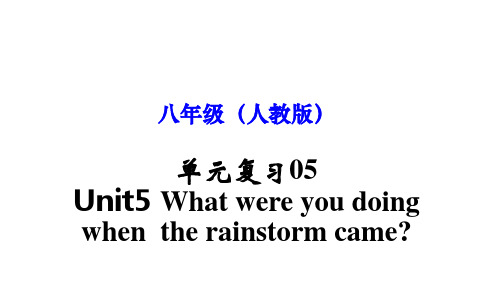
单词过过过
10.Please remember t_o_c_lo_s_e___ (close) the door before leaving. 11.Mike was doing his homework while Katew_as_c_o_o_k_in_g_ (cook) dinner. 12.Many people are against __b_ui_ld_i_n_g_(build) a new zoo in the town. 13.The ground was covered with ___fa_l_le_n__(fall) leaves.
单词过过过
Ⅰ.根据句意及汉语提示写出所缺的单词 1.There was something wrong with my ___al_a_rm___(闹钟), so I got up
late this morning. 2.The sailor found something __st_r_an_g_e__(奇怪的) at the bottom of
(错过公共汽车).
短语过过过
6.当我姐姐正在写作业时,我正在打篮球。 I ___w_a_s _ __p_la_y_in_g_ basketball __w_h_i_le__ my sister ___w_a_s__ __d_o_in_g___ homework.
7.当暴风雨来的时候,他正在回家的路上。 He was on his way home __a_t___ ___th_e___ ___t_im_e__ ___o_f___ the rainstorm.
5.They continued playing soccer on the playground though it was raining ___he_a_v_il_y_(大量地).
人教版(PEP)四年级英语下册(Unit 1-6)单元知识梳理(1)
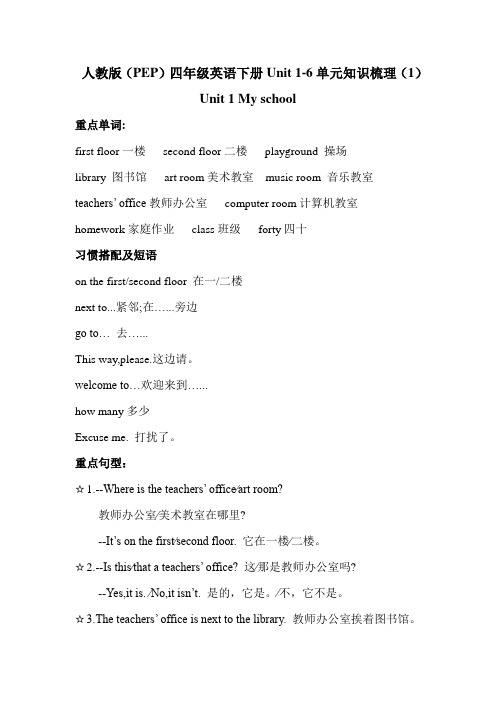
人教版(PEP)四年级英语下册Unit 1-6单元知识梳理(1)Unit 1 My school重点单词:first floor一楼second floor二楼playground 操场library 图书馆art room美术教室music room 音乐教室teachers’ office教师办公室computer room计算机教室homework家庭作业class班级forty四十习惯搭配及短语on the first/second floor 在一/二楼next to...紧邻;在…...旁边go to…去…...This way,please.这边请。
welcome to…欢迎来到…...how many多少Excuse me. 打扰了。
重点句型:☆1.--Where is the teachers’ office∕art room?教师办公室∕美术教室在哪里?--It’s on the first∕second floor. 它在一楼∕二楼。
☆2.--Is this∕that a teachers’ office? 这∕那是教师办公室吗?--Yes,it is. ∕No,it isn’t. 是的,它是。
∕不,它不是。
☆3.The teachers’ office is next to the library. 教师办公室挨着图书馆。
☆4.--Do you have a library? 你们(学校)有图书馆吗?--Yes, we do. ∕No,we don’t.语法点:特殊疑问句Where’s the+事物? ……在哪里?及其回答:It’s+表地点的介词短语。
它在……一般疑问句:--Do you have+某物?你/你们有……吗?肯定回答:--Yes,I/we do.否定回答:--No,I/we don’t.Is this∕that…? 这∕那是…?肯定回答:--Yes, it is.否定回答:No, it isn’t.Unit2 What time is it?重点词汇:breakfast 早餐lunch午餐dinner 晚餐go to bed 上床睡觉English class 英语课music class音乐课PE class体育课get up 起床go home 回家go to school 上学习惯搭配及短语:hurry up快点come on快;加油just a minute稍等一会儿Breakfast is ready.早餐准备好了。
教科版五年级英语上学期期末复习资料(三)各单元重点知识

学习必备欢迎下载五年级英语上学期期末复习资料(三)各单元重点知识班级:姓名:Unit 1:What ’ s your hobby?一、兴趣爱好的词组: play computer games, play music,collect stamps, keep pets,make model ships, read books, take photos,make cakes, plant trees, grow flowers, study plants, listening tomusic, singing,dancing,drawing,play the piano, play chess,play basketball⋯二、句型 :1.What’ s your hobby?2. Do you like Yes,⋯? I do. / No, I don’ t.3.I love/like⋯4. I enjoy⋯5.I am good at ⋯6. My (favourite) hobby is⋯7.⋯ is my (favourite) hobby.8. Is your hobby keeping pets?Yes, it is./ No, it isn’ t.三、重点精析:1. love/like/enjoy doing sth喜欢做某事如: I like listening to music.我喜欢听音乐。
2.My hobby is doing sth我的爱好是⋯⋯如: My hobby is reading books.我的爱好是看书。
3. more than⋯多于⋯⋯超,过⋯⋯ from来自于如: I have collected more than 3 hundred stamps from 20 countries.我已收集了来自二十个国家的300 多张邮票。
4. every每一的,每个的every day每天every night每晚 every year每年every Friday每周五5. during +时间表示在某段时间里during the day在白天 during the summer holiday在暑假期间6. some of +名词⋯⋯中的一些如: Some of the students are from America.这些学生中的一些来自美国。
人教版四年级英语全册复习资料整理

四年级英语全册归类复习资料上册单词、词汇:Unit 1 My classroomwindow窗户board 写字板light 灯picture 图画door 门floor 地板classroom教室computer 计算机teacher’s desk 讲台wall 墙fan 电扇Unit 2 My schoolbagChinese 语文English 英语math 数学schoolbag书包story-book 故事书notebook笔记本twenty二十twenty-one二十一thirty 三十forty 四十fifty五十bag书包pencil铅笔pen钢笔book书本ruler尺子pencil-case铅笔盒Unit 3 My friendslong长的short 短的\矮的hair头发thin瘦的strong 强壮的quiet文静的music 音乐science科学sports 运动computer game电脑游戏painting画画teacher老师student学生男孩boy girl女孩friend朋友Unit 4 My homestudy 书房bathroom 浴室bedroom 卧室kitchen 厨房living room 起居室(客厅) phone电话bed床sofa 沙发shelf书架fridge冰箱table桌子home家room房间school学校classroom教室desk课桌chair椅子window窗户bed床Unit 5 What would you like ?rice米饭fish鱼noodles面条beef牛肉vegetables蔬菜soup汤knife小刀chopsticks筷子spoon勺子plate盘子fork叉子rice米饭fish鱼beef牛肉bread面包milk牛奶egg鸡蛋water水chicken鸡肉Unit 6 Meet my familyfamily家庭parents父母uncle叔叔;舅舅aunt姨,姑baby婴儿baseball player棒球运动员sister姐妹brother兄弟father父亲mother母亲driver司机doctor医生farmer农民nurse护士下册单词、词汇:Unit 1:Our schoolplayground 操场garden 花园teacher’s office 教师办公室library 图书馆canteen 食堂art room绘画教室computer room 计算机教室washroom卫生间music room音乐教室gym体育馆TV room 电视机房computer计算机board写字板fan风扇light灯this这;这个is是my我的that那;那个your你的teacher’s desk讲台picture图画;照片wall墙壁floor地板yes是;是的it它Unit 2:What time is it?lunch午餐English class 英语课music class 音乐课breakfast早餐dinner晚餐P.E. class体育课get up起床go to school 上学go home 回家go to bed 上床睡觉one一two二three三four四five五six六seven七eight八nine九ten十what什么time时间it’s=it is …o’clock …点钟math数学Chinese语文English英语P.E.体育music音乐for为;给class课程Unit 3: Is this your shirt?sweater毛衣jeans牛仔裤pants长裤socks袜子shoes鞋子shorts短裤jacket夹克衫shirt衬衫skirt裙子dress连衣裙T-shirtT恤衫red红色的blue蓝色的yellow黄色的green绿色的white白色的no不;不是not不;不是的colour颜色Unit 4:It’s warm today.hot炎热的weather report 天气预报rainy下雨的snowy下雪的windy有风的cloudy多云的warm暖和的cold寒冷的cool凉爽的today今天jeans牛仔裤pants长裤socks袜子shoes鞋子let’s=let us play玩;踢football足球snowy下雪的sunny晴朗的Unit 5:How much is it?colourful 色彩丰富的pretty漂亮的,可爱的cheap 便宜的expensive昂贵的sneakers胶底帆布鞋,slippers拖鞋sandals凉鞋boots 靴子how much多少钱big大的small小的long长的short短的apple苹果banana香蕉pear梨orange橙子watermelon西瓜are是they 它(他、她)们Unit 6:At a farm.sheep绵羊hen 母鸡lamb小羊,羔羊goat山羊cow 奶牛tomato西红柿cucumber黄瓜potato土豆onion 洋葱carrot 胡萝卜horse马aren’t=are not cat猫rabbit兔子pig猪duck鸭子dog 狗eleven 十一twelve十二thirteen 十三fifteen十五twenty二十how many多少there那儿;那里四年级全册重点句型:(上)Unit 1 1、What’s in the classroom ? 教室里面有什么?Many desks and chairs. 许多课桌和椅子。
五年级下册英语第十一单元weather的句型整理
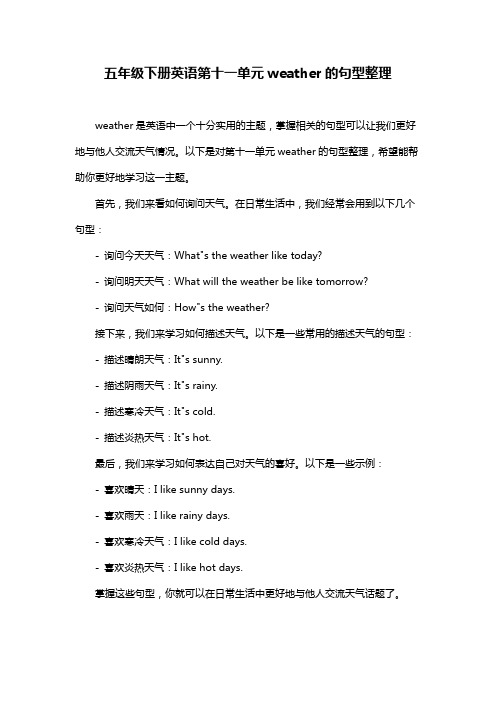
五年级下册英语第十一单元weather的句型整理
weather是英语中一个十分实用的主题,掌握相关的句型可以让我们更好地与他人交流天气情况。
以下是对第十一单元weather的句型整理,希望能帮助你更好地学习这一主题。
首先,我们来看如何询问天气。
在日常生活中,我们经常会用到以下几个句型:
- 询问今天天气:What"s the weather like today?
- 询问明天天气:What will the weather be like tomorrow?
- 询问天气如何:How"s the weather?
接下来,我们来学习如何描述天气。
以下是一些常用的描述天气的句型:- 描述晴朗天气:It"s sunny.
- 描述阴雨天气:It"s rainy.
- 描述寒冷天气:It"s cold.
- 描述炎热天气:It"s hot.
最后,我们来学习如何表达自己对天气的喜好。
以下是一些示例:
- 喜欢晴天:I like sunny days.
- 喜欢雨天:I like rainy days.
- 喜欢寒冷天气:I like cold days.
- 喜欢炎热天气:I like hot days.
掌握这些句型,你就可以在日常生活中更好地与他人交流天气话题了。
人教版四年级英语下册1-6单元知识点复习
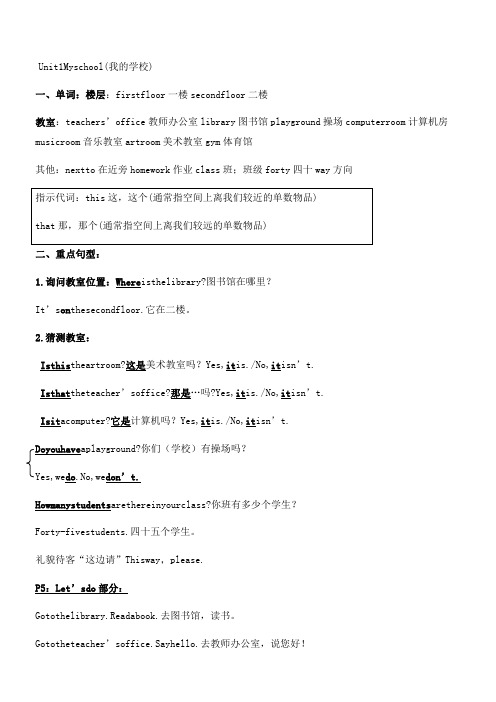
Unit1Myschool(我的学校)一、单词:楼层:firstfloor一楼secondfloor二楼教室:teachers’office教师办公室library图书馆playground操场computerroom计算机房musicroom音乐教室artroom美术教室gym体育馆其他:nextto在近旁homework作业class班;班级forty四十way方向Howmanystudents arethereinyourclass?Forty-fivestudents.四十五个学生。
礼貌待客“这边请”Thisway,please.P5:Let’sdo部分:Gotothelibrary.Readabook.去图书馆,读书。
Gototheteacher’soffice.Sayhello.去教师办公室,说您好!Gototheplayground.Playfootball.去操场,踢足球。
Gotothegarden.Watertheflowers.去花园,浇花。
三、四会单词和四会句子P9:Thisisthelibrary.Thatistheplayground.这是图书馆。
那是操场一、课程:二、P15:Let’sdo部分.Timeforbreakfast.Let’sdrinksomemilk.该吃早餐了。
让我们喝些牛奶吧。
Timeforlunch.Let’shavesomechicken.该吃午餐了。
让我们吃些鸡肉吧。
Timefordinner.Let’seatsomerice.该吃晚餐了。
让我们吃些米饭吧。
TimeforPEclass.Let’sjumpandrun.该上体育课了。
让我们跳和跑吧。
TimeforEnglishclass.Let’sreadandwrite.该上英语课了。
让我们读和写吧。
Timeformusicclass.Let’ssinganddance.该上音乐课了。
让我们唱歌和跳舞吧。
pep小学四年级下册英语复习教案

It’s time to…后面跟动词。如:It’s time to eat dinner.该吃晚饭了。
It’s time to have English class.该上英语课了。
补充资料
目标检测题
目标达成
情况
课堂小结
与反思
作业与练习
5.
6.2.复习句子
句子:
1、This is the teacher’s office.这是老师办公室。
2、That is the playground.那是操场。
3、Go to the library. Read a story-book..去图书馆。读故事书。
4、Is this the library? Yes, it is.这是图书馆吗?是的。
四会单词和句子的背诵
板
书
设
计
课题
Unit 3Weather
课时安排
1课时
学习
目标
能在情景中灵活运用句型Can I go outside now?Yes,you can ./No,you can’t.What’s the weather like in..? It’s…询问他人意见、天气情况并能进行回答。
5、Do you have a library? Yes,we do./No,we don’t.
6、Where is the library? It’s on the first floor.(on the third; on the 4th; on the 5th…….)图书馆在哪里?在一楼。(三楼、四楼、五楼……)
2.playground garden library canteen art room light picture board
人教版九年级英语期中复习知识点归纳总结(Unit1-6)
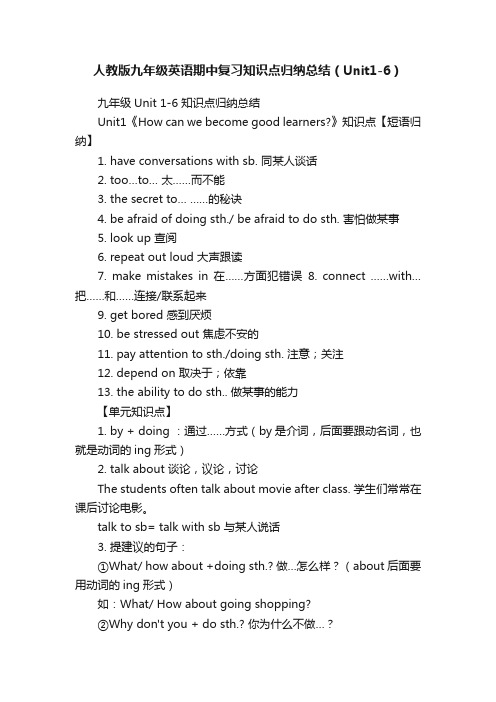
人教版九年级英语期中复习知识点归纳总结(Unit1-6)九年级Unit 1-6 知识点归纳总结Unit1《How can we become good learners?》知识点【短语归纳】1. have conversations with sb. 同某人谈话2. too…to… 太……而不能3. the secret to… ……的秘诀4. be afraid of doing sth./ be afraid to do sth. 害怕做某事5. look up 查阅6. repeat out loud 大声跟读7. make mistakes in 在……方面犯错误8. connect ……with… 把……和……连接/联系起来9. get bored 感到厌烦10. be stressed out 焦虑不安的11. pay attention to sth./doing sth. 注意;关注12. depend on 取决于;依靠13. the ability to do sth.. 做某事的能力【单元知识点】1. by + doing :通过……方式(by是介词,后面要跟动名词,也就是动词的ing形式)2. talk about 谈论,议论,讨论The students often talk about movie after class. 学生们常常在课后讨论电影。
talk to sb= talk with sb 与某人说话3. 提建议的句子:①What/ how about +doing sth.? 做…怎么样?(about后面要用动词的ing形式)如:What/ How about going shopping?②Why don't you + do sth.? 你为什么不做…?如:Why don't you go shopping?③Why not + do sth. ? 为什么不做…?如:Why not go shopping?④Let's + do sth. 让我们做…吧。
Unit5必背知识(知识清单)-英语四年级下册单元速记巧练(译林版三起)
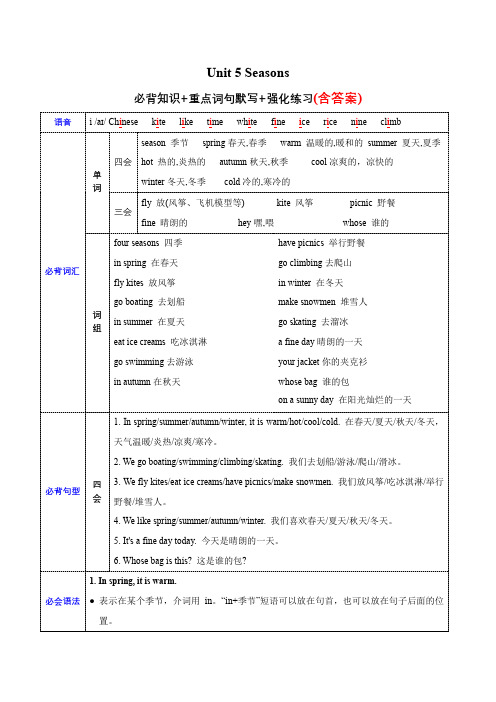
6.Whosebagisthis?这是谁的包?
必会语法
1.Inspring,itiswarm.
表示在某个季节,介词用in。“in+季节”短语可以放在句首,也可以放在句子后面的位置。
“Itis+天气情况.”用来形容天气特征,此处it表示天气。例:
winter冬天,冬季cold冷的,寒冷的
三会
fly放(风筝、飞机模型等)kite风筝picnic野餐
fine晴朗的hey嘿,喂whose谁的
词组
fourseasons四季
inspring在春天
flykites放风筝
goboating去划船
insummer在夏天
eaticecreams吃冰淇淋
goswimming去游泳
________ ________,itis________.
5.我喜欢冬天。在冬天,我去溜冰,堆雪人。
Ilike________.In________,Igo________and________ ________.
6.—这是谁的包?—它是我的包。
—________bagis________?—________ ________bag.
三、1.summer,It,hot2.It's,flykites3.havepicnics,goclimbing4.Inspring,warm
5.winter,winter,skating,makesnowmen6.Whose,this,It'smy7.season,like,likespring
四、1.Inautumn,itiscool.
重点词句默写通关(有答案)
Module1Unit1What’stheweatherlike_(课件)(一起)英语二年级下册

Look and say
Presentation
What is the weather like
It’s hot and sunny.
It’s cold and windy.
Read and say
Presentation
1. What’s the weather like It’s sunny and hot.
Look and say
Presentation
What is the weather like It’s sunny.
Look and say
Presentation
What is the weather like It’s windy.
Look and say
Presentation
What is the weather like It’s raining.
What’s the weather like on Friday/… It’s …
Make a poster
Production
Describe the weather of five cities and draw them on your poster with your partner.
What’s the weather like in … It’s …
What did you learn
Summary
Words: sunny, windy, rain, snow
Sentences: What is the weather like It’s …
Homework
1. Draw your favorite season and write down at least three sentences. 2. Observe the weather in a week and finish the blank.
英语:Unit-5-《What’s-the-Weather-like?》复习课件(1)(北京课改版七年级下)
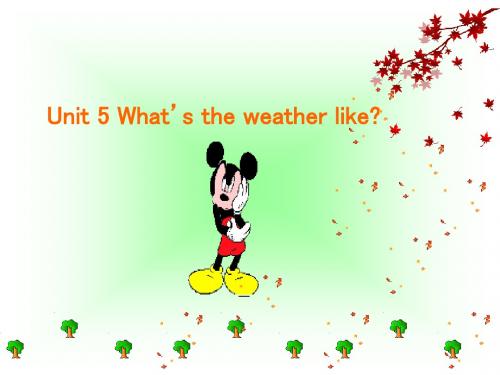
1)remember to do sth. 记住做某事 例如:
It’s raining outside. Remember to take an
umbrella with you.
Remember to drink a glass of milk before
you go to bed.
Remember not to drink cold water.
2)plenty of
大量的,例如:
plenty of time 大量的时间,许多时间
pleቤተ መጻሕፍቲ ባይዱty of people 许多人
【典型例题】
1)Remember _________ your homework to school tomorrow.
B. and
C. in
D. of
2)There will be thunderstorms with _________ wind.
A. hot
B. warm
C. cold
D. cool
4. Thank you for listening. Thank you for (doing) sth. 谢谢你做某事。
B: It’s a _______ (rain) day. 2)A: What will the weather be like next week?
B: It _______ (be) snowy and cold. 3)There _______ (be) a strong wind in the
(2)The high will be 18℃. (3)Today will be sunny with a gentle
四年级上册英语教案-Unit5《Weather》|鲁科版(五四学制)(三起)

四年级上册英语教案-Unit 5《Weather》|鲁科版(五四学制)(三起)教学内容本单元围绕“天气”这一主题展开,通过多种活动形式,让学生掌握描述天气的英语词汇和句型。
教学内容包括:1. 天气词汇:sunny, cloudy, rainy, windy, snowy2. 描述天气的句型: What's the weather like today? It's sunny/cloudy/rainy/windy/snowy.3. 天气图标及其含义4. 日常对话练习,模拟在不同天气下的交流情景教学目标1. 知识与技能:学生能够听懂、会说、会读本单元的天气词汇和句型,并能运用所学知识进行简单的日常对话。
2. 过程与方法:通过观察、模仿、实践等方式,让学生在真实情境中学习和运用英语。
3. 情感态度价值观:培养学生对英语学习的兴趣,增强他们观察和描述身边事物的能力。
教学难点1. 正确发音和记忆天气词汇。
2. 灵活运用句型进行对话。
教具学具准备1. 天气词汇卡片2. 天气图标卡片3. 彩色粉笔4. 录音机及教学录音带5. 天气预报视频片段教学过程第一课时导入利用天气预报视频片段导入新课,让学生初步感知天气主题。
通过问答游戏,复习已学过的相关词汇。
新课内容学习新的天气词汇和句型,通过模仿、跟读、角色扮演等方式进行实践。
利用天气图标卡片,让学生将词汇与图标对应,加深记忆。
巩固练习小组活动,每组制作一张天气卡片,并上台展示。
学生之间进行“天气侦探”游戏,互相提问并回答天气情况。
第二课时复习与导入复习上一课时学过的词汇和句型。
通过天气预报视频,让学生复习并运用所学知识。
深化学习通过角色扮演,让学生模拟在不同天气下的对话情景。
引导学生观察周围环境,用英语描述实际天气。
互动游戏组织“天气转盘”游戏,学生根据指针所指天气进行快速反应。
布置作业:让学生记录一周的天气情况,并用英语进行描述。
板书设计1. 在黑板上画出不同的天气图标,并标注相应的英语词汇。
八年级英语下册Unit-5知识点总结Unit5-What-were-you-doing-when-the-rainstorm-came

八年级英语下册Unit-5知识点总结Unit5-What-were-you-doing-w hen-the-rainstorm-cameUnit5 What were you doing when the rainstorm came?一.基础知识讲解.What were people doing yesterday at the time of the rainstorm?昨天当暴风雨来临的时候人们正在做些什么?【解析1】过去进行时过去进行时态⑴ .用法:①过去某个时间正在发生的动作He was cooking at six last night. 昨天晚上六点,他正在做饭。
②过去某段时间正在发生的动作I was staying here from March to May last year.去年从3月到5月,我一直呆在这里。
⑵ .与过去进行时连用的时间状语,常见的有at nine last night/ at that time= then/at this time yesterday /或有when the teacher came in/ while he was reading的提示⑶过去进行时的构成:was\were +现在分词⑷过去进行时的四个基本句型肯定句He was cooking at six lastnight.否定句He was not cooking at six last night.一般疑问句Was he cooking at six last night?两回答Yes ,he was. No, he wasn’t.特殊疑问句What was he doing at six last night?⑸过去进行时的固定句型Jim was reading when the teacher came in. 当老师进来的时候,吉姆正在读书。
Jim was reading while Kate was watching TV.在凯特正在看电视的同时,吉姆正在读书。
《What’s the weather like?》教学设计

课题
What’s the weather like?
学科
英语
年级
四年级上
教材内容分析
本课学习的主题是天气,情景图以人们在不同天气下出行为背景,呈现本课的核心句型“It's sunny/ .. today.”及表示天气和自然景物的单词,并以转盘游戏的形式呈现了核心问句“What's the weather like? It's .. and...”板块Look, listen and say以不同天气情 况下人们的出行的情景呈现核心句型“It's sunny/ .. today.”及表示天气的单词sunny, cloudy , windy, rainy和表示自然事物的单词sun, cloud, wind, rain。板块二Ask and answer以转盘游戏的形式呈现核心句型“What's the weather like? It' s... and...”以及表示气候特点的单词warm, cool。本课的核心句型是“What’s the weather like? It’s+天气形容词.” 本课的核心词汇是“sunny,rainy,windy,cloudy”,拓展词汇是“warm,cool”。学生已经学习过表达气温的单词hot和cold。在此基础上,本课在本课继续学习核心句型“What's the weather like? It's .. and...”及It’s +天气形容词.
(1)养成关心天气变化的习惯
(2)了解谈论天气所具有的寒暄功能。
(3)培养乐于运用英语进行交流和表达的能力
重难点
1. 学生能听、说、认读重点词汇:sunny, rainy, windy, cloudy,warm,cool,weather等。
新湘少版英语四年级下册复习资料1-12单元
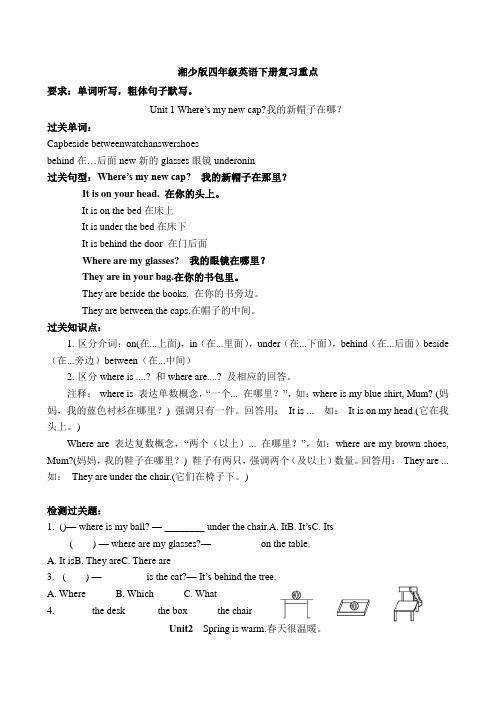
湘少版四年级英语下册复习重点要求:单词听写,粗体句子默写。
Unit 1 Where’s my new cap?我的新帽子在哪?过关单词:Capbeside betweenwatchanswershoesbehind在…后面new新的glasses眼镜underonin过关句型:Where’s my new cap?我的新帽子在那里?It is on your head. 在你的头上。
It is on the bed在床上It is under the bed在床下It is behind the door 在门后面Where are my glasses?我的眼镜在哪里?They are in your bag.在你的书包里。
They are beside the books. 在你的书旁边。
They are between the caps.在帽子的中间。
过关知识点:1.区分介词:on(在...上面),in(在...里面),under(在...下面),behind(在...后面)beside (在...旁边)between(在...中间)2.区分where is ....? 和where are....? 及相应的回答。
注释:where is 表达单数概念,“一个... 在哪里?”,如:where is my blue shirt, Mum? (妈妈,我的蓝色衬衫在哪里?) 强调只有一件。
回答用:It is ... 如:It is on my head.(它在我头上。
)Where are 表达复数概念,“两个(以上)... 在哪里?”,如:where are my brown shoes, Mum?(妈妈,我的鞋子在哪里?) 鞋子有两只,强调两个(及以上)数量。
回答用:They are ... 如:They are under the chair.(它们在椅子下。
)检测过关题:1. ()— where is my ball? —________ under the chair.A. ItB. It’sC. Its( ) — where are my glasses?— _________ on the table.A. It isB. They areC. There are3.( ) — ________ is the cat?—It’s behind the tree.A. WhereB. WhichC. What4. _______the desk______ the box______the chairUnit2Spring is warm.春天很温暖。
人教版七下英语U5-12复习知识点

Unit 5 Why do you like pandas?1.回答why的提问要用because2.Kind of =a little/a bit + adj.稍微有点...Kind:种类:a kind of 意为“一种”,some kinds of 意为“几种”,all kinds of 意为“各种各样的”。
Different kinds of...不同种类的...3,Why not do =Why don’t you+do 你为什么不…?4,walk on two legs用两条腿走5,all day =the whole day整天all night整晚6,来自be/ come fromwhere do they come from?=where are they from?7,more than=over超过less than 少于8,once 一次twice 两次three times三次9,be in great danger 处于极大危险中10,one of… …之一+名复数后面动词用单数One of the students is Li Ming.11,get lost迷路12,with/ without 有/ 没有13,a symbol of ... ......的象征14,由…制造be made of能看出原材料be made from 看不出原材料be made in+地点表产地15,cut down 砍到动副结构(代词放中间,名词可放中间或者后面cut it down cut them downCut off 切除cut up 切碎cut into 切成...16. —Why…? 为什么……?—Because…因为……17. let sb. do sth. 让某人做某事18.want (sb)to do sth. 想要(某人)做某事19. help sb. (to) do sth. 帮助某人做某事20. be friendly to sb. 对某人友好【典句必背】1. —Why do you like pandas? 你为什么喜欢熊猫?—Because they’re kind of interesting. 因为它们有点儿有趣。
- 1、下载文档前请自行甄别文档内容的完整性,平台不提供额外的编辑、内容补充、找答案等附加服务。
- 2、"仅部分预览"的文档,不可在线预览部分如存在完整性等问题,可反馈申请退款(可完整预览的文档不适用该条件!)。
- 3、如文档侵犯您的权益,请联系客服反馈,我们会尽快为您处理(人工客服工作时间:9:00-18:30)。
